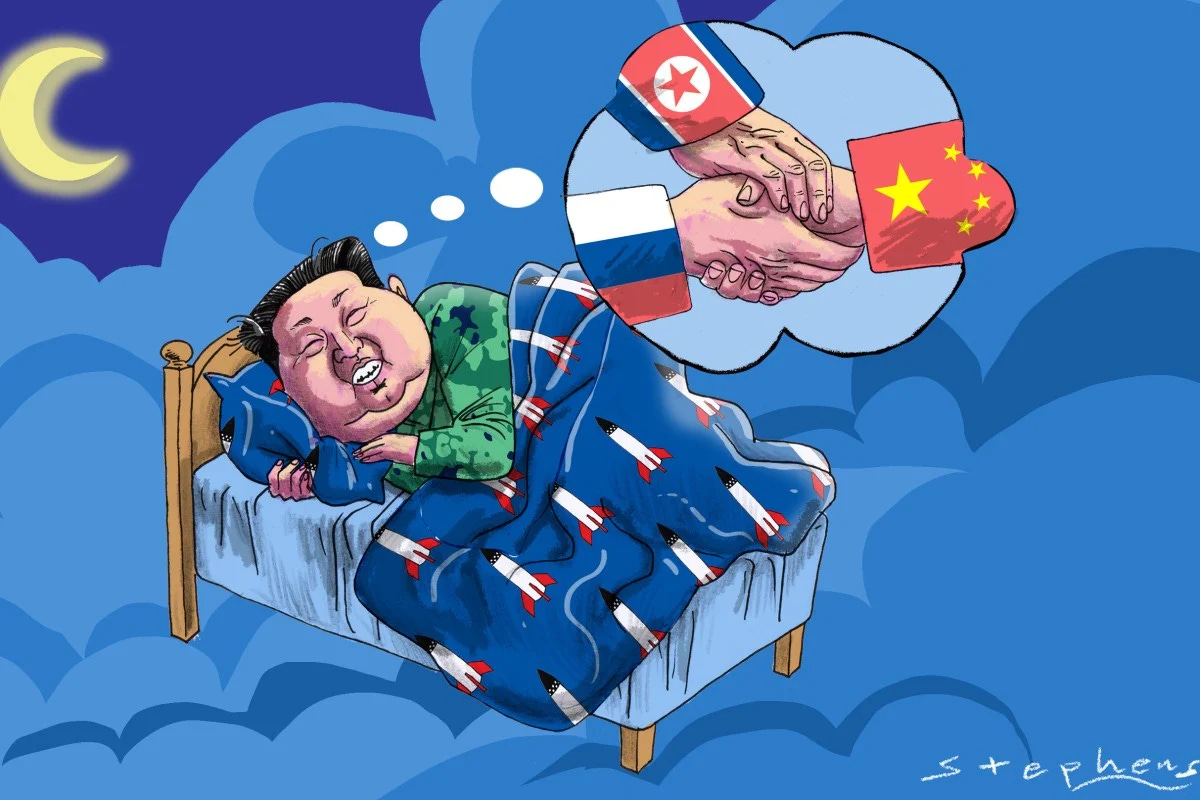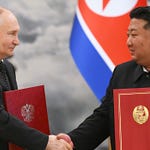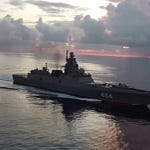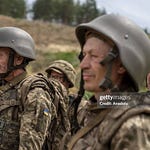Topics:
Welcome back to Political Misfits on Radio Sputnik, where we bring you news, politics and culture - without the red and blue treatment. I am John Kiriakou here with Michelle Witte.
Welcome back to Political Misfits on Radio Sputnik, where we bring you news, politics and culture - without the red and blue treatment. I am John Kiriakou here with Michelle Witte.
President Vladimir Putin and North Korean leader Kim Jong Un agreed upon a mutual defense pledge yesterday in Pyongyang that calls for them to assist each other in the event of “aggression” by another country. Although the details of the agreement have not been released, it appears also that North Korea will provide Russia with artillery, ballistic missiles, and munitions and, over the longer term, “does not exclude the development of military-technical cooperation.” Both sides criticized the United States for holding military exercises in the region with South Korea and Japan. Russia and North Korea have signed diplomatic and military agreements in the past, but this new agreement is the first since 1961 that calls for mutual defense.
We're joined by foreign affairs and security analyst Mark Sleboda.
Putin and Kim Sign Pact Pledging Mutual Support Against 'Aggression'
North Korea's Kim declares 'full suussian war in Ukraine
https://x.com/PaulNiland/status/1803314363798819220
Russia and North Korea sign mutual defence pact | Russia | The Guardian
Questions:
Thanks for being with us, Mark. Let’s start with the bilateral agreement that was announced this morning between Moscow and Pyongyang. I know that we don’t have all the details yet, but what can you tell us about the broad strokes?
Key points of North Korea, Russia landmark strategic partnership treaty | Reuters
Russia and North Korea: what can they do for each other? | Russia | The GuardianThe US press yesterday, before the agreement was announced, was replete with language that Russia was “desperate”--that was the word–for artillery. Is that true? And even if it isn’t, is artillery a major part of this agreement?
Exclusive: Russia producing three times more artillery shells than US and Europe for Ukraine | CNN Politics
South Korean Artillery Supply Allows U.S. to Delay Decision on Cluster Munitions for Ukraine - WSJ
What Weapons Is North Korea Accused of Supplying to Russia? - The New York TimesRussia and North Korea have had defense cooperation agreements in the past. During the Cold War, there was an agreement that called for mutual defense assistance. Is that what we’re looking at here? Would Russia be compelled to defend North Korea in case of an attack and vice versa?
(Full text of treaty below)What does this agreement mean for the rest of East Asia? The South Koreans and Japanese must be worried about it. What are the Chinese saying?
South Korea considers giving arms to Ukraine after Russia-North Korea pact | AP News
Russia and North Korea’s Defense Pact Is a New Headache for China - The New York TimesThe White House said this morning that a new American agreement with Ukraine allows Kiev to fire American weapons into Russian territory “anywhere that Russian forces are coming across the border to attack Ukraine,” according to National Security Advisor Jake Sullivan. This seems to mean that Ukraine can attack anywhere in Russia with US support. Is that your analysis? This seems like a real ratcheting up of support for hostilities.
US says Ukraine can hit inside Russia ‘anywhere’ its forces attack across the border - POLITICOMark, an analysis in the New York Times today says that China is not necessarily excited about this agreement between Russia and North Korea because it would give the United States a reason to focus more actively on East Asia, including a beefed up naval presence that would raise the risk of an accidental confrontation between the US and China. Do you agree with that?
Russia and North Korea’s Defense Pact Is a New Headache for China - The New York Times
Russia, North Korea sign treaty on comprehensive strategic partnership; Moscow ‘more capable of playing long game’ with West - Global Times
There’s also some news about the EU-Russia relationship, such as it is. The EU has just approved sanctions on Russian natural gas. Politico is describing these sanctions as “unprecedented,” and says “the penalties won’t hit the majority of Russia’s liquid natural gas (LNG) exports to the EU. Instead, they will ban EU ports from reselling Russian LNG after it arrives and block financing for Russia’s planned Arctic and Baltic LNG terminals.” Hungary and Germany had been the holdouts on the deal, but have been won over. According to this story, the EU isn’t actually using much of the gas itself - instead, EU companies are importing it from Russia and reselling it, which I guess would indicate that this won’t cause further energy problems in the EU, but will just hurt the businesses engaged in that selling - which brings about $8 billion euros a year to Russia, the story says. Explain these sanctions to us, and the impact you’d expect them to have.
EU approves first-ever sanctions on Russian gas – POLITICO
——————————————————————————————————
ON THE COMPREHENSIVE STRATEGIC PARTNERSHIP BETWEEN THE DEMOCRATIC PEOPLE'S REPUBLIC OF KOREA AND THE RUSSIAN FEDERATION
Pyongyang June 20. /KCNA/—On June 19, the Secretary General of the WPK, Chairman of State Affairs of the DPRK, respected comrade Kim Jong-un, and the President of the Russian Federation, comrade Vladimir Vladimirovich Putin, signed the “Agreement on a Comprehensive Strategic Partnership between the Democratic People’s Republic of Korea and the Russian Federation.”
Below is the full text of the agreement signed by the top leaders of the DPRK and the Russian Federation.
The Democratic People's Republic of Korea and the Russian Federation, hereinafter referred to as the Parties, based on the common desire and desire to preserve the historically formed traditions of Korean-Russian friendship and cooperation, to build future-oriented interstate relations of a new era, thereby promoting the prosperity and well-being of the peoples of the two countries, expressing confidence that the development of relations of a comprehensive strategic partnership of the Parties meets the fundamental interests of their peoples and contributes to ensuring peace, regional and global security and stability, confirming their commitment to the purposes and principles of the UN Charter, as well as other generally recognized principles and norms of international law, reaffirming their desire to protect international justice from hegemonic aspirations and attempts to impose a unipolar world order, to establish a multipolar international system based on good faith cooperation of states, mutual respect for interests, collective resolution of international problems, cultural and civilizational diversity, the supremacy of international law in international relations, to jointly counteract any challenges posed by endangering the existence of mankind, seeking, by strengthening comradely and friendly bilateral ties, as well as expanding and strengthening cooperation in all areas, to bring Korean-Russian relations to a sustainable level conducive to regional and international peace and prosperity, have agreed on the following:
Article 1
The Parties constantly support and develop, taking into account the legislation of their states and their international obligations, relations of comprehensive strategic partnership based on the principles of mutual respect for state sovereignty and territorial integrity, non-interference in internal affairs, equality and other principles of international law relating to friendly relations and cooperation between states.
Article 2
The parties, through dialogue and negotiations, including at the highest level, exchange views on issues of bilateral relations and the international agenda of mutual interest, and also strengthen joint coordination and interaction on international platforms.
In an effort to establish global strategic stability and a new fair and equitable international order, the Parties maintain close communication with each other and strengthen tactical and strategic cooperation.
Article 3
The Parties shall cooperate with each other to ensure lasting regional and international peace and security.
In the event of an immediate threat of an act of armed aggression against one of the Parties, the Parties, at the request of one of the Parties, shall immediately use bilateral channels for consultations in order to coordinate their positions and agree on possible practical measures to assist each other to help eliminate the emerging threat.
Article 4
If one of the Parties is subjected to an armed attack by any state or several states and thus finds itself in a state of war, the other Party will immediately provide military and other assistance with all means at its disposal in accordance with Article 51 of the UN Charter and in accordance with legislation of the Democratic People's Republic of Korea and the Russian Federation.
Article 5
Each Party undertakes not to enter into agreements with third states directed against the sovereignty, security, territorial integrity, right to free choice and development of political, social, economic and cultural systems and other key interests of the other Party, and not to take part in such actions.
The Parties do not allow third states to use their territory for the purpose of violating the sovereignty, security, or territorial integrity of the other Party.
Article 6
The parties support each other's peaceful policies and measures aimed at protecting their state sovereignty, ensuring their security and stability, defending their right to development, and also actively cooperate with each other in pursuing such policies aimed at establishing a fair multipolar new world order.
Article 7
Guided by the goals of maintaining international peace and security, the Parties consult and cooperate with each other within the framework of international organizations, including the UN and its specialized agencies, on issues of global and regional development that directly or indirectly may pose a challenge to the common interests and security of the Parties.
The Parties shall cooperate and mutually support the membership of each Party in relevant international and regional organizations.
Article 8
The parties create mechanisms for joint activities to strengthen defense capabilities in the interests of preventing war and ensuring regional and international peace and security.
Article 9
The parties are interacting to jointly confront growing challenges and threats in areas of strategic importance, including food and energy security, information and communications technology (ICT) security, climate change, healthcare and supply chains.
Article 10
The parties promote the expansion and development of cooperation in trade, economic, investment, scientific and technical fields.
The parties make efforts to increase the volume of mutual trade, create favorable conditions for economic cooperation in customs, monetary and financial and other areas, and also encourage and protect mutual investments in accordance with the Agreement between the Government of the Democratic People's Republic of Korea and the Government of the Russian Federation on the promotion and mutual protection of investments of November 28, 1996.
The Parties provide assistance to special/free economic zones of the Democratic People's Republic of Korea and the Russian Federation and organizations with their participation.
The parties develop exchanges and cooperation, and also actively encourage joint research in the field of science and technology, including such areas as space, biology, peaceful nuclear energy, artificial intelligence, information technology and others.
Article 11
The parties support the development of interregional and cross-border cooperation in areas of mutual interest, based on its special importance for expanding the entire range of bilateral relations.
The parties create favorable conditions for establishing direct connections between the regions of the Democratic People's Republic of Korea and the Russian Federation, promote mutual awareness of their economic and investment potential, including through business missions, conferences, exhibitions, fairs and other joint interregional events.
Article 12
The parties are strengthening exchanges and cooperation in the fields of agriculture, education, healthcare, sports, culture, tourism and other areas, and interacting in the field of environmental protection, prevention and relief from natural disasters.
Article 13
The parties are developing cooperation in matters of mutual recognition of standards, test reports and certificates of conformity, direct application of standards, exchange of experience and the latest achievements in the field of ensuring uniformity of measurements, training of experts and promoting the recognition of test results between the Democratic People's Republic of Korea and the Russian Federation.
Article 14
Each Party protects the legal rights and interests of legal entities and citizens of the other Party located on its territory.
The parties cooperate on the provision of legal assistance in civil and criminal cases, the extradition and transfer of persons sentenced to imprisonment, as well as the implementation of agreements in the field of return of assets obtained by criminal means.
Article 15
The parties are deepening contacts between the legislative, executive and law enforcement bodies of the two countries, exchanging experiences and opinions in the field of adoption and application of laws and on other issues of mutual interest.
Article 16
The Parties oppose the use of unilateral coercive measures, including those of an extraterritorial nature, and consider their introduction illegal and contrary to the UN Charter and international law. The parties coordinate efforts and interact in order to support multilateral initiatives aimed at eliminating the practice of using such measures in international relations.
The Parties guarantee the non-application of unilateral coercive measures aimed directly or indirectly at one of the Parties, individuals and legal entities of such Party or their property under the jurisdiction of such Party, goods, work, services, information, results of intellectual activity, including exclusive rights to them, originating from one Party, intended for the other Party.
The Parties shall refrain from joining unilateral enforcement measures or supporting such measures of any third party if such measures affect or are directed directly or indirectly at one of the Parties, individuals and legal entities of such Party or their property under the jurisdiction of such third party, goods originating from one Party, intended for the other Party, and (or) works, services, information, results of intellectual activity, including exclusive rights to them, provided by suppliers of the other Party.
If unilateral coercive measures are introduced against one of the Parties by any third party, the Parties shall make practical efforts to reduce the risks, eliminate or minimize the direct and indirect impact of such measures on mutual economic relations, individuals or legal entities of the Parties or their property located in the jurisdiction Parties, goods originating from one Party, intended for the other Party, and (or) works, services, information, results of intellectual activity, including exclusive rights to them provided by suppliers of the Parties. The Parties shall also take steps to limit the dissemination of information that could be used by such third party to impose and escalate such measures.
Article 17
The parties cooperate in the fight against international terrorism and other challenges and threats, including extremism, transnational organized crime, human trafficking and hostage-taking, illegal migration, illicit financial flows, legalization (laundering) of proceeds from crime, terrorist financing and proliferation financing weapons of mass destruction, illegal actions that pose a threat to the safety of civil aviation and maritime navigation, illegal trafficking in goods, funds and monetary instruments, as well as illegal trafficking in narcotic drugs, psychotropic substances and their precursors, weapons, cultural and historical values.
Article 18
The parties interact in the field of international information security and strive to strengthen bilateral cooperation, including through the development of an appropriate regulatory framework and deepening interdepartmental dialogue.
The parties contribute to the formation of a system for ensuring international information security, including through the development of universal legally binding documents.
The Parties advocate equal rights for states in managing the Internet information and telecommunications network, as well as against the malicious use of ICT in order to discredit the dignity and reputation of sovereign states and encroach on their sovereign rights, and consider any attempts to limit the sovereign right to regulate and ensure security unacceptable national segments of the global network.
The parties are expanding cooperation in the field of combating the use of ICTs for criminal purposes, including the exchange of information to prevent, detect, suppress and investigate crimes and other offenses related to the use of ICTs.
The Parties coordinate actions and jointly promote initiatives within international organizations and other negotiation platforms, cooperate in the field of digital development, exchange information and create conditions for interaction between the competent authorities of the Parties.
Article 19
The parties cooperate in the field of printing and publishing activities.
The parties encourage the promotion of Korean and Russian literature in their states, promote the study of the Korean language in the Russian Federation and the Russian language in the Democratic People's Republic of Korea, and also promote mutual acquaintance and communication between the peoples of the Democratic People's Republic of Korea and the Russian Federation.
Article 20
The parties promote broad cooperation in the media sphere in order to increase the level of knowledge about the life of the peoples of the two countries, promote objective information about the Democratic People's Republic of Korea and the Russian Federation and bilateral cooperation in the global media space, further create favorable conditions for interaction between national media, strengthen coordination in countering disinformation and aggressive information campaigns.
Article 21
The Parties actively cooperate in order to conclude and subsequently implement industry agreements aimed at implementing this Treaty, as well as agreements in other areas not provided for by this Treaty.
Article 22
This Treaty is subject to ratification and enters into force on the date of exchange of instruments of ratification.
From the date of entry into force of this Treaty, the Treaty on Friendship, Good Neighborhood and Cooperation between the Democratic People's Republic of Korea and the Russian Federation of February 9, 2000 shall cease.
Article 23
This Treaty is valid for an indefinite period.
If one of the Parties intends to terminate this Agreement, it must notify the other Party in writing. The Agreement is terminated one year from the date of receipt of written notice by the other Party.
Done in Pyongyang on June 19, 2024, in two copies, each in Korean and Russian, both texts being equally authentic.
FOR THE KOREAN PEOPLE'S DEMOCRATIC Kim Jong-un
FOR THE RUSSIAN FEDERATION OF THE REPUBLIC V. Putin















Russian-North Korean Alliance Spooks West, China's Take on Russian-NK Alliance, US Escalates Strikes Against Russia, EU Sanctions Itself Again, more...